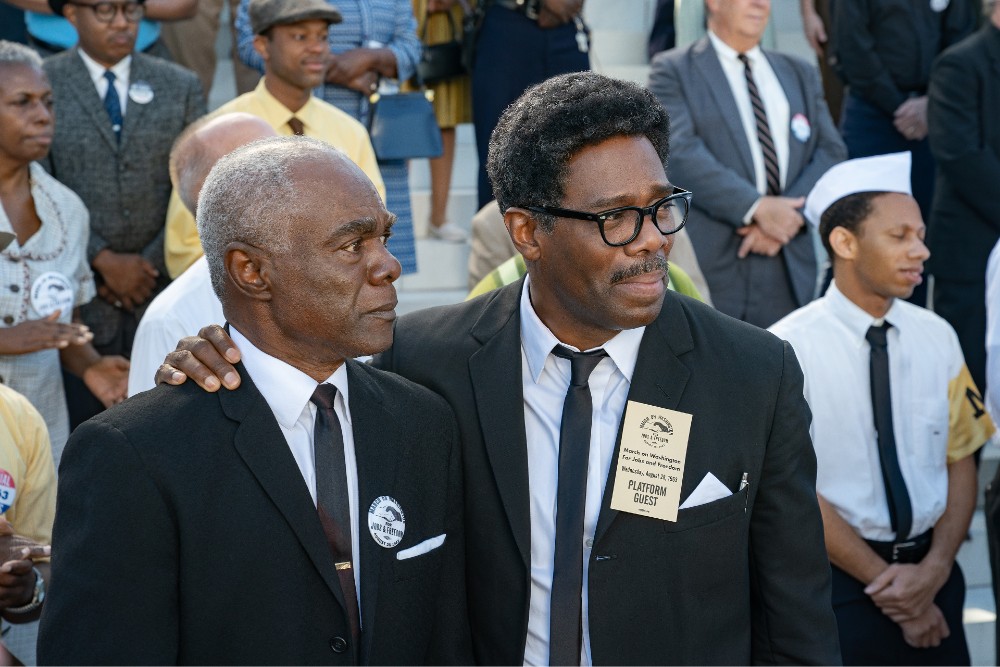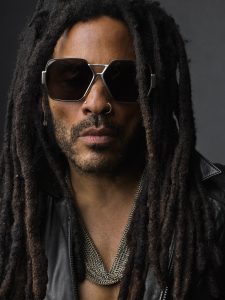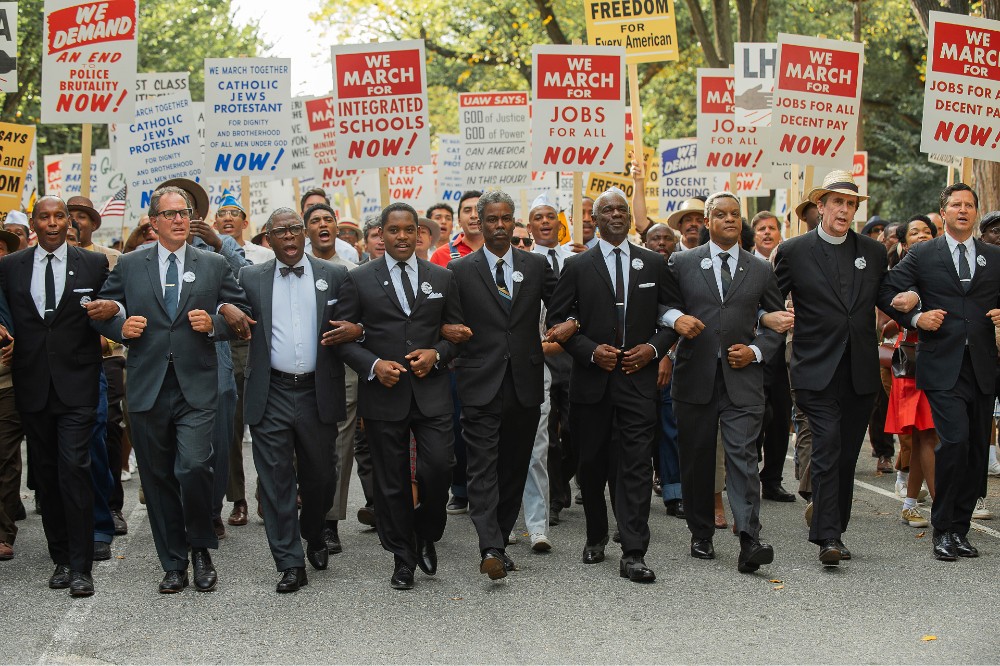
Lenny Kravitz is no stranger to capturing the sound of love. Throughout his career, he’s released numerous albums that express the power, joy, and sometimes, the pain of love, whether it’s about romance or, in the case “Road to Freedom,” Bayard Rustin (Colman Domingo) and his relationship to the world around him. Filmmaker George C. Wolf tells the story of one of the men behind 1963 March on Washington, but also, a man who won’t let society stop him from spreading love.
It’s a story Kravitz not only helps tell but finish with the song, “Road to Freedom,” which plays over the end credits of the drama. The artist, whose albums tend to blend genres, was a fitting choice for Rustin. He didn’t produce and write a song that falls into one genre or box; it’s a song and story that’s bigger than that.
“I was there to serve a purpose,” Kravitz told Below the Line. “I was there to work for the film, work for the character, work for the director, and it’s a place of service. I did what I wanted to do, but were there comments? Yes. Were there changes I had to make? Yes. Was there guidance? Yes. And that’s the collaborative experience that I learned to love even more.”
Recently, Kravitz spoke with Below the Line about his experience making “Road to Freedom,” his collaboration with George C. Wolf, and why he’s proud of his debut album, “Let Love Rule,” which celebrates its 35th anniversary this year.
Below the Line: How are you feeling about 2024?

Lenny Kravitz: I tend to be positive regardless of what’s going on on the planet. So I feel hopeful, I feel renewed. I feel like those that are meant to spread love and shine in the light will do more, do better.
For myself, I’ll speak for myself, I’m going to do more, I’m going to do better. I’m going to do my best to really represent what it is that I believe in.
BTL: Excellent. You must be feeling good, too, about the song’s reception and the new album coming out, right?
Kravitz: Yes, I’m happy about the song. Yes, I’m happy that people are feeling it and the award nominations and all, but what I’m really happy about and honored about is being a part of telling the story of Bayard Rustin.
I grew up in a family that was involved in the Civil rights movement and I had never heard of Bayard Rustin, and I was embarrassed by that. When I first got the phone call, I was like, I heard his name, but I didn’t know the story. I didn’t know his involvement. And of course, we know why, but I just felt like I heard my mother’s voice.
When I got the call, I was in the middle of finishing my album, I was in Paris. I really didn’t have time to do it because of the things that I was doing, having to finish and deadlines and blah, blah, blah. And I heard my mother’s voice, “You have to do this, and it’s about the legacy of this man.” So that’s what I’m most happy about. Yes, you get to have success, and people like the song, but it’s about something that’s very important.
BTL: From the interviews I’ve read with you, you seem especially happy with where you’re at these days, creatively. Did it feel like this project and song came to you at just the right time?
Kravitz: I mean, I always have a great time creatively. It’s always different. It grows, it changes, but if there’s something you’re supposed to do in life, it’s going to happen at the right time, in the right way. I firmly believe that. And so, the pressure was on because when I make music for myself… At this point, I had already kind of said I was done with my album and I had to turn it in, and then of course, I went back in and I kept polishing, but I don’t normally have any time constraints.
I do what I do, I turn it in, and then we start a cycle. But they call me for this, and of course they need it yesterday, and there’s nothing, and a whole team of people are waiting for this, and I got quiet, and for about 48 hours, I watched the movie a couple of times. I spoke to George Wolf about his feelings about it. I called Colman.
Nobody asked me to call Colman, but I called him because he just portrayed this person, this spirit, and I asked him some questions, and I kept walking by the piano and I wasn’t feeling anything. And then I just sat down, as I said, a couple days into this thought process, put my hands down, hit the first chord, and it all came. That moment, for me, is how I work primarily. We have to just be quiet and wait to receive what it is that you are to be given, as opposed to forcing something out, which one can do.
You can sit down and say, “Okay, I’m going to write a song right now.” But for me, I prefer for the creative spirit to give it to me. I prefer to hear it, then we can work on it, we can embellish, we can go deeper, we can do whatever. But I like to catch that thing that’s floating out there and get me going.
BTL: Quincy Jones is a big inspiration for you, and he’s one of the people that understood the tone and soul of a movie maybe better than anyone in his compositions. Was Quincy on your mind at all when you worked on “Road to Freedom”?
Kravitz: I didn’t think about Quincy in that particular time, but Quincy’s always in the back of my heart, he’s always right there. Quincy educated me about producing and arranging and feeling. I’d say as far as the records that I listened to growing up, Motown in general, their whole crew, Quincy, Maurice White, Earth, Wind and Fire, those records taught me so much about arranging.
BTL: How’d you want the arrangement and style to best represent Rustin?
Kravitz: I knew that I wanted it to be rooted in gospel, R and B, and that I wanted a choir. And actually, the idea for the trombones was George Wolf. He had been listening to these trombone choirs from the Carolinas that played gospel hymns, spiritual music. They’re all trombones, and that was a sound and a feeling that matched his film, his story, his expression, and so it was his idea. I’ve used horns a lot, and I love to arrange horns, but I wasn’t a hundred percent familiar with the gospel trombone choir.
So I checked out some videos and watched them, and I was like, oh, okay, I understand this, of course. And then I called Trombone Shorty, who is my brother, my friend who played in my band when he was 17. I took him on his first world tour and had to get a note from his mom. He wasn’t of age yet, but an incredible musician, genius human being. And so, he had 48 hours where he could fly from the states to Paris in between tour dates to come and do this for me. He came and blessed me and put those beautiful trombones on the recording.
BTL: When you’re working with Trombone or the choir, what kind of atmosphere do you want to create for them to do their best work?
Kravitz: Open, loving, collaborative. People give you their best when they feel safe and when they feel heard. “Let’s try this. Let’s try that. Okay, okay. Here’s the part. Okay, now you twist it.” Fun; we had fun. Singing, playing music, we have to remember, music is to soothe the soul, it’s to heal. It is to express joy and happiness and other things too, blues or heartbreak. But we’re there to have fun, we’re there to make music. And it’s not often that I have so many people in the studio because I play all the instruments and I do what I do.
So I’m always loving when people do come, I have horns or orchestras or choirs. It’s so much fun to have all that energy in the studio. They came in, showed them what it was, and they nailed it. I mean, got to remember, they’re French. I was in Paris, first of all, wondering where I was going to find a gospel choir. There was one. I thought I was going to have to do a recording from New York, do one of those thing through the lines, but they were there and the only thing that we really had to work on was their pronunciation, that was because they are French speaking, but they got it, nailed it, and put so much love onto the track and power.

BTL: They sound beautiful. As someone who’s written a lot about peace and love, as you do in this song, is that ever difficult? Are there days where those feelings are harder to access and put down on paper?
Kravitz: For some reason? It’s just in me. It’s what I believe in. I believe in the power of love. It’s the most powerful energy we have. And in the end, I believe that love will triumph. Peace will triumph, God will triumph, unity will triumph. But we’re going through it, man.
If you would’ve asked me in ’89 when I came out with “Let Love Rule,” if I thought 35 odd years later, whatever it is, if you asked me if I thought we’d be in a better place, I would’ve said yes at that time thinking that our evolution would take us to a better place of peace and understanding and learning to live together, to cohabitate, to settle disputes without violence. And as we see, it’s not the case.
So we really need this more than ever, all of us to represent in whatever way it is. My little way is my little way, but we all have to… How we wake up in the morning, how we treat ourselves, how we treat our loved ones, and the people that we deal with every day is the beginning of all that. There’s that hymn, there’s that hymn that I sang in church as a kid when my mom would take me to church, “Let there be peace on earth and let it begin with me.” That is true. It’s very true.
BTL: I like that the song celebrates that as well. It’s a celebratory song.
Kravitz: Yeah, when I got those words, we’re on the road to freedom… Wow, okay. That road is endless. As long as we’re on this Earth, it’s the same battle. It’s the same energy, and that lyric says, “And so here we are still on that road, still pushing boundaries.”
BTL: How is it performing the song live?
Kravitz: We did it on Kimmel, on Jimmy Kimmel. Oh, it was beautiful. It’s beautiful to play it live, man. It was the first time. It’s the first time I’ve done that live, so I’m sure it will grow as I continue to do it, but I thought it was, it was a good first performance.
BTL: What else did George want from the song? What were some of the feelings and sounds he wanted to leave the audience with?
Kravitz: George’s main thing was that you just watched this film for an hour and whatever it is, half or two or whatever, and when it goes to black and that song comes in, it has to pick up right from that point. And so, those were things that we went through in the writing process.
In the recording process, I would send him roughs and he’d say that word, that phrase, that sentence, is there another way you could say this? Because it had to really match everything he had just done for the whole time in that film and not take away from it. And even the sound, like he said, “There’s a little bit too much reverb on your voice in the beginning. I need it to be more intimate. We’re not at the Washington Memorial yet. We’re not there yet. We can’t open it up yet.” So he had really interesting sonic ideas and word ideas so that it would match the tone of what we just experienced.
BTL: Would you ever want to score a film?
Kravitz: Absolutely, yeah, I’d love to score a whole film. Absolutely.
BTL: As you said, it’s the 35th anniversary of “Let Love Rule” this year, so congratulations. That’s a great debut album.
Kravitz: Thank you.
BTL: How does it feel looking back on that album now? What does it mean to you today?
Kravitz: I fought for my creativity. I didn’t sign deals that wanted to change me, that wouldn’t let me produce my music, that wouldn’t give me creative control. I waited years for that deal from a teenager, and I’m so glad that I did because that record just came out of me.
It was given to me, and it set the tone for everything that I would do from then on. So, the record stands up. The record stands up, and that’s the most important for me, that it’s not dated or trendy or whatever, or stuck to any particular time. It just is what it is, and that those are the kind of records that I strive to make.
BTL: I’ll just leave you with, we talked about peace and love songs, but I really enjoy it when you go dark. Off of “Let Love Rule,” I think “Song for Sister Someone” is one of your best songs.
Kravitz: Thank you. Yes it is, yes it is [dark]. About a heroin addict, yes, it is. It’s funny, I was thinking about that track the other day because we’re putting together the set list for the tour, and it’s a dark one, but it’s beautiful.
BTL: I don’t know how it plays live, probably a song you gotta ease people into, but that’s a song I’d want to hear live.
Kravitz: I got you. I got you. We’ll pull it out.
Rustin is now available to stream on Netflix.





